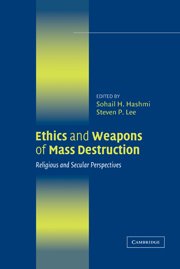Book contents
- Frontmatter
- Contents
- Tables and Figures
- Acknowledgments
- Abbreviations
- Ethics and Weapons of Mass Destruction
- Introduction
- 1 Weapons of Mass Destruction: A Brief Overview
- 2 The International Law Concerning Weapons of Mass Destruction
- PART ONE THE ORIGINAL DEBATE
- PART TWO EXPANDING THE CONVERSATION
- 11 Buddhist Perspectives on Weapons of Mass Destruction
- 12 Buddhism and Weapons of Mass Destruction: An Oxymoron?
- 13 Confucianism and Weapons of Mass Destruction
- 14 “Heaven's Mandate” and the Concept of War in Early Confucianism
- 15 Hinduism and the Ethics of Weapons of Mass Destruction
- 16 Hinduism and Weapons of Mass Destruction: Pacifist, Prudential, and Political
- 17 Islamic Ethics and Weapons of Mass Destruction: An Argument for Nonproliferation
- 18 “Do Not Violate the Limit”: Three Issues in Islamic Thinking on Weapons of Mass Destruction
- 19 Judaism, War, and Weapons of Mass Destruction
- 20 Between the Bible and the Holocaust: Three Sources for Jewish Perspectives on Mass Destruction
- PART THREE CRITICAL PERSPECTIVES
- Contributors
- Index
19 - Judaism, War, and Weapons of Mass Destruction
Published online by Cambridge University Press: 05 June 2012
- Frontmatter
- Contents
- Tables and Figures
- Acknowledgments
- Abbreviations
- Ethics and Weapons of Mass Destruction
- Introduction
- 1 Weapons of Mass Destruction: A Brief Overview
- 2 The International Law Concerning Weapons of Mass Destruction
- PART ONE THE ORIGINAL DEBATE
- PART TWO EXPANDING THE CONVERSATION
- 11 Buddhist Perspectives on Weapons of Mass Destruction
- 12 Buddhism and Weapons of Mass Destruction: An Oxymoron?
- 13 Confucianism and Weapons of Mass Destruction
- 14 “Heaven's Mandate” and the Concept of War in Early Confucianism
- 15 Hinduism and the Ethics of Weapons of Mass Destruction
- 16 Hinduism and Weapons of Mass Destruction: Pacifist, Prudential, and Political
- 17 Islamic Ethics and Weapons of Mass Destruction: An Argument for Nonproliferation
- 18 “Do Not Violate the Limit”: Three Issues in Islamic Thinking on Weapons of Mass Destruction
- 19 Judaism, War, and Weapons of Mass Destruction
- 20 Between the Bible and the Holocaust: Three Sources for Jewish Perspectives on Mass Destruction
- PART THREE CRITICAL PERSPECTIVES
- Contributors
- Index
Summary
This study of the Jewish attitude toward weapons of mass destruction presents the classical sources and principles on war and its conduct, followed by contemporary applications on the subject of WMD in America and Israel.
SOURCES AND PRINCIPLES
Types of wars
The Jewish ethics of war focuses on two issues: its legitimation and its conduct. The Talmud classifies wars according to their source of legitimation. Biblically commanded wars are termed mandatory (mitzvah). Wars undertaken with the approval of the Sanhedrin are termed discretionary (reshut). There are three types of mandatory wars: Joshua's war of conquest against the seven biblical Canaanite nations, the war against the biblical Amalek, and defensive wars against an attack in progress. Discretionary wars are usually expansionary efforts undertaken to enhance the political prestige of the government or to secure economic gain.
The first type of mandatory war is only of historical interest, as the Canaanite nations lost their national identity already in ancient times. This conclusion, which appears repeatedly in rabbinic literature, is part of a tendency to blunt the impact of the seven-nations policy. The Bible points out that these policies were not implemented even during the zenith of ancient Israel's power. Indeed, a pronouncement in the biblical exegetical literature of late antiquity known as Midrash explicitly excludes the possibility of transferring the seven-nations ruling to other non-Jewish residents of the land of Israel.
- Type
- Chapter
- Information
- Ethics and Weapons of Mass DestructionReligious and Secular Perspectives, pp. 363 - 384Publisher: Cambridge University PressPrint publication year: 2004
- 1
- Cited by

